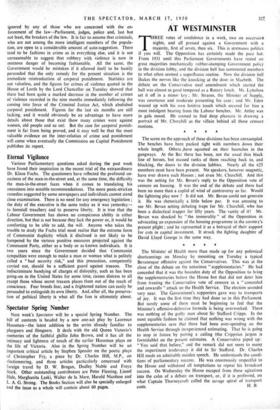Eternal Vigilance
Various Parliamentary questions asked during the past week have found their inspiration in the recent trial of the extraordinary Dr. Klaus Fuchs. The questioners have reflected the profound un- easiness of the man-in-the-street and, at the same time, the difficulty the man-in-the-street faces when it comes to translating his uneasiness into sensible recommendations. The more panic-stricken remedies suggested by some newspapers and individuals cannot stand close examination. There is no need for any emergency legislation ; the duty of the executive is the same today as it was yesterday— to forestall treachery and to preserve liberty. It is true that the Labour Government has shown no conspicuous ability in either direction, but that is not because they lack the power or, it would be comforting to be able to add, the will. Anyone who takes the trouble to study the Fuchs trial must realise that the extreme form of Communist duplicity which it disclosed is not likely to be hampered by the various punitive measures projected against the Communist Party, either as a body or as known individuals. It is two years since the Government decided that Communist sympathies were enough to make a man or woman what is politely called a " bad security risk," and this precaution, competently carried out, should be a sufficient guard against treason. The indiscriminate bandying of charges of disloyalty, such as has been going-on in the United States for some time, causes distress to all except those whose secret treason places them out of the reach of conscience. Fear breeds fear, and a frightened nation can easily be persuaded to extinguish its own liberty. And, after all, the preserva- tion of political liberty is what all the fuss is ultimately about.


































 Previous page
Previous page